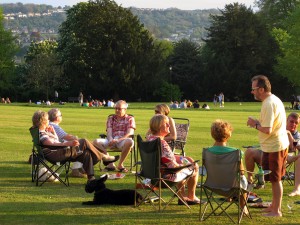The medical profession is ignoring the thing that contributes most to our survival, says Robin Dunbar, professor of experimental psychology at Oxford University. It isn’t diet, exercise, or medication – it’s our social networks. I translate that to mean friends, family, church fellowships, colleagues, social clubs, and people we interact with at the post office, hairdresser, and when shopping.

In order to feel better, humans need the ‘sense of community’ that comes from being able to share stories with friends. ”Your social network will have a bigger impact on your survival than anything the doctors can throw at you,’ he said, speaking at The Times Cheltenham Science Festival. His finding confirms other studies showing how interacting with others contributes to our health and wellbeing. It is our relationships that have the strongest impact on survival, even on patients who’d had heart attacks. And better health is found amongst mothers and toddlers with lively social networks. Yet, ‘‘despite these findings, the importance of social networks has been ignored completely by the medical profession,’ Professor Dunbar said.
Well, perhaps not entirely. At the other end of the scale, at the Centre for Ageing at Rush University, Chicago, Professor Wilson’s research team found such strong evidence that feelings of loneliness among older people double the risk of dementia that he suggested that pharmaceutical companies come up with a pill that would alleviate them. But what could doctors prescribe for patients’ with poor social networks? Perhaps they could point them to local social clubs and events, and even to churches. Now that would be a good idea!
Sadly, though, there are older people with no social networks at all. Poor mobility means they’re confined to their homes, and they’ve simply lost friends and family as they’ve either died or moved away. Part of the answer could be the internet. In a previous blog I described how a Granddad was being set up with an iPad so he could keep in touch with relatives overseas. And I’ve read how one County is training older people to use Ipads and tablets to help them keep in touch. Professor Rubin believes that relying on social media will not have the same effect, but I think it’s a lot better than nothing. I have a colleague who was thinking of moving house when she retired to be closer to her daughter and family, but now they’re using Skype they don’t feel the same need.
It may not suit everybody, but I find Facebook pretty amazing. I open it up and have an instant overview of how life is treating my friends and family all over the world. I’ve made new friends; have accompanied some on their dementia journey,and have even been invited by another Louise Morse, a gracious American lady, to visit her in the States.

Photograph, Jude Cann Hunt
I’ve been encouraged by serious discussions about Jesus, and by the motivational posts, including Scripture and comment, and the photographs and video clips. Some of the photographs are incredibly beautiful, obviously taken by people with talent. Deryn van der Tang, who runs the retirement housing in Bedford is one – her photograph of the Great Ouse River in Bedford with its flower filled banks was so good we used it on the cover of the latest Pilgrims’ Magazine. And a new friend, Jude Cann Hunt, posts photographs so full of atmosphere and meaning you want to just sit and gaze. It’s such a rich world I can see how people could become addicted.
It is interesting to see how much research is simply restating the wisdom of the Bible. ‘It is not good for man to be alone,’ God said from the beginning, and the Scriptures are full of instruction and advice on how to live alongside one another. How to build one another up, and encourage each other. How to bear one another’s burdens. God made man to live and develop in relationship with others – it doesn’t work otherwise. As researchers are finding.
















Can I also recommend joining a local Shopmobility and using their scooters and wheelchairs to access town and shopping centres? It is not just mobility we give our members here in Stockport but a chance to escape the confines of their homes and interact with the community: our staff and volunteers, people in the shops etc. You cannot put a price on it. A recent survey has shown that many of our users would be more at risk of anxiety, depression and physical health problems if we did not exist.